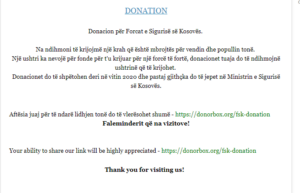A fake page soliciting donations in the name of the KSF (Kosovo Security Force) is circulating online. However, this page has not been created by the Ministry of Defense of Kosovo. In this regard, the Embassy of the Republic of Kosovo in the USA has classified it as a long-standing fake platform, warning the diaspora not to fall victim to this fraudulence.
Nevertheless, this page continues to be accessible, and in its content, it states: "Help us create a wing that is protective of our country and our people. An army needs funds to be created for a strong force, your donations will help the army to be established. Donations will be collected until 2020 and then everything will be handed over to the Ministry of Security of Kosovo." However, the text contains spelling errors, and from the written sentences, it is implied that it was created by someone who is not proficient in the Albanian language. Errors are also noticed in the part where the Ministry of Defense is referred to as the "Ministry of Security of Kosovo". The fact that this page has been recently reintroduced is confirmed by the date that still indicates the year 2022.

Within the framework of the page, there is a special section where donations can be made. When clicked, the amounts presented range from 5 to 20 euros, or any other amount depending on how the potential donor chooses to contribute. Within the same section, personal data such as name, surname, and email are then requested. There is also an option for the donor to remain anonymous. Once these details are filled in, bank card details are then requested.

There, the mandate of the KSF is also described - as it is written: "tasked with conducting crisis response operations in Kosovo and abroad and civil protection operations in Kosovo." However, there are inaccuracies even in the name of the KSF Commander, where it is stated to be Rahman Rama. But in November 2021, Rama resigned from the position of KSF Commander, and his successor is the current Commander, Bashkim Jashari.
After the page was reintroduced, the Embassy of Kosovo in the United States of America, through an announcement, has made it known that the link has nothing to do with donations to the KSF Security Fund.
"We remind you that the only form of donation for the Kosovo Security Force (KSF) is through the account in the Central Bank of the Republic of Kosovo, the Security Fund account," says the Embassy's announcement.
Regarding this page, Sbunker has requested clarification from the Ministry of Defense if this has been reported and if the measures were taken, but the Ministry has not provided a response.
The fund referred to by the Embassy of Kosovo in the USA was established on March 1, 2022, with the decision of the Prime Minister of Kosovo, Albin Kurti. The donations collected are intended to be used for enhancing the military capacities of the KSF, in line with Kosovo's national security strategy. So far, the amount of funds collected is unknown, as the Government has not provided any data, despite requests from civil society organizations to do so. Four of these organizations have requested the Ministry of Finance, Labour, and Transfers, as well as the Information for Privacy Agency, to make public the information related to the Security Fund. However, based on a decision by the Former State Treasury General Director, Ahmet Ismajli, this information is considered confidential. According to him, "unauthorized disclosure of this data, especially the total amount collected and the number of contributors, could harm the security interests of the Republic of Kosovo, both regionally and beyond."
Meanwhile, the Ministry of Finance, Labour, and Transfers of Kosovo, which manages the Fund has previously stated that they "are transparent and available to state authorities," without specifying which institutions have this right. reported se cilat institucione e kanë këtë të drejtë.
*This article is published as part of the Western Balkans Regional Initiative against disinformation. “Western Balkans Anti-Disinformation Hub: exposing malign influences through watchdog journalism.”




























































